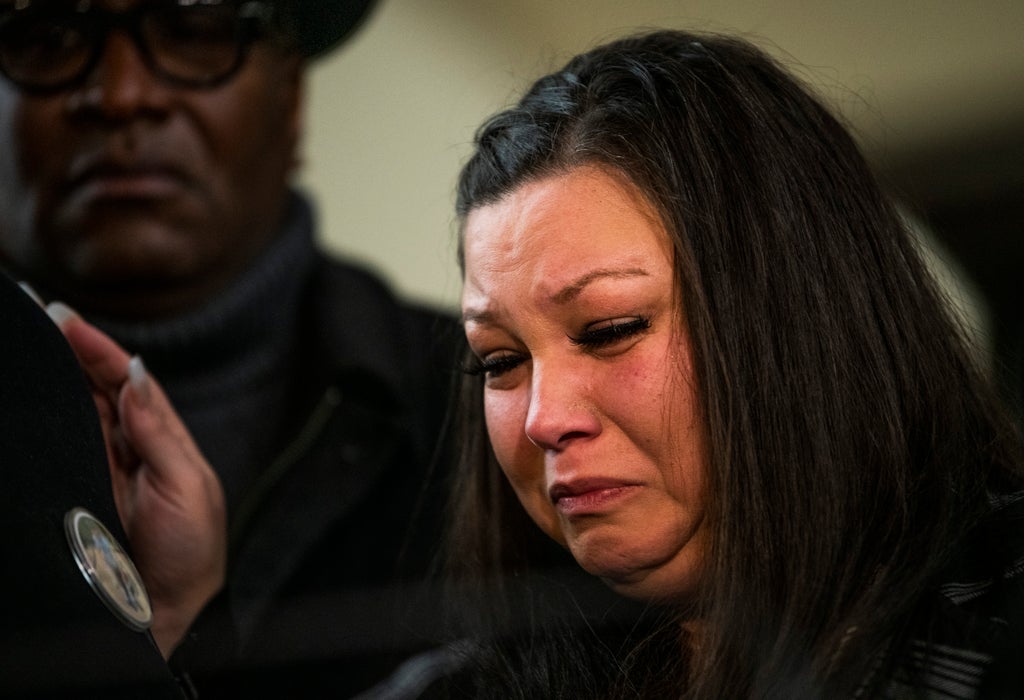
Katie Wright was asked by the court to spell her name. But everybody knew who she was.
“Daunte Wright is my son, my baby boy,” she said. “And I say ‘is’ and not ‘was’ because he will always be my son. And I’m proud to say that.”
She added: “I’ve had many many sleepless nights and days contemplating how and what I was going to say today. I have to be the voice for myself, my family, my community, but most of all, I have to be the voice for my son, Daunte.”
For the next ten minutes, what poured out of the mother of the young man shot and killed by a police officer in the Minneapolis suburbs a year ago was excruciating to witness.
Much of it was anger. She was furious with the police officer, Kim Potter, who withdrew her handgun rather than a Tazer during a traffic stop last April, and pulled the trigger in what she said was a lethal error. She was outraged the officer had not only robbed her of her son, but had robbed her grandson of his father. She felt the officer failed to show any remorse, and was particularly incensed that Potter did not even use Daunte’s name during the trial, referring instead to him as “the driver”.
At times she choked up, particularly when she mentioned her son’s name.
It was painful, too, to listen to Daunte’s father, Aubrey Wright. In the ten months since his 20-year-old son was fatally shot in the Minnesota city of Brooklyn Center, the young man’s mother has most frequently been the public face of the family’s grief. And on Friday, at Potter’s sentencing, Daunte’s father once again kept his words brief and praised his son who, he said, was created out of “the unconditional love that me and his mother had for each other”.
It would have taken a cold heart to have listened to Kim Potter, the officer with two years’ experience with the Brooklyn Center Police Department, and not felt some empathy, too. She told the young man’s mother she had not looked at her during the trial because she did not feel she had the right to be in the same room as her, let alone make eye contact. “I pray for Daunte and all of you, many times a day,” sobbed Potter, who was convicted last December of manslaughter. “Daunte is never more than a thought away from my heart, and I have no right for that, for him to be in my heart.”
Judge Regina Chu said the case had been one of the hardest she had dealt with in more than 20 years. She eventually sentenced Potter to two years, less than the state’s sentencing guidelines, and of which only 16 months will likely be served. She said the lesser sentence was warranted because Potter had committed the crime while “in the line of duty”.
Many, especially the young people of Brooklyn Center, will feel outrage over the the modest sentence handed down to Potter. Daunte’s mother did, saying the “system murdered him all over again”.
Others will perhaps feel that Potter made a bad, deadly mistake, albeit a genuine one.
When Potter set off for work on the morning of Sunday April 11, 2021, she did not intend to take the life of an unarmed 20-year-old, pulled over for an outstanding arrest warrant. Yet she did.
And she did so because of a skewed and screwed-up criminal justice system, beset by structural and individual racism, that results in hundreds of young Black men and women getting shot and killed by police every year.
It is because too many police forces across the United States — and Brooklyn Center’s was one of the very worst at this — do not seek a diverse workforce. It is because many police forces in this nation have their origins in “slave patrols”, established to round up those seeking their freedom. It is because there are too many guns in America, too many in the hands of ordinary citizens, and too many in the hands of police officers. And those officers — from almost 18,000 different departments across the nation — receive no standardized training, and vast numbers of them receive almost none.
On a day like today, an appropriate sentence can help provide a sense of justice to a family and a community, just as an inappropriate one can leave them feeling victimized all over again. Yet for our broader society, a fixation on sentences can miss the bigger point.
When Derek Chauvin, the killer of George Floyd, and whose trial was taking place as Daunte Wright was shot and killed, was sentenced to 22 and a half years, people in Minneapolis were happy that justice had been delivered. But they pointed out that for all the attention it had received, the killing of George Floyd and the conviction of Chauvin was just a single case; the entire system was broken, they said, and no single case sentence was going to fix it.
If, as the judge said on Friday, Potter’s conduct that day “was not significantly more serious than that typically involved in the commission of the crime in question”, how can that not be the clearest call yet of the need for wholesale reform?
For such awful crimes to stop happening, to put an end to such scenes of anguish as displayed by Daunte’s mother, America needs to built a criminal justice system — and as part of it, a series of police forces — that is truly just.
As the young man’s mother said to the court: “Daunte Demetrius Wright, I will continue to fight in your name until driving while Black is no longer a death sentence.”







